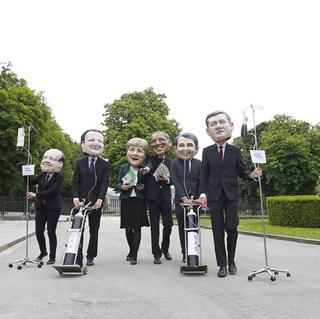
介绍:
Leaders of the world's major economies are gathering in Brussels for the Group of Seven summit without Russia.
The situation in Ukraine is topping their agenda.
CRI's Alexander Aucott has more.
Reporter:
When German Chancellor Angela Merkel arrived at the G7 summit in Belgium, she confirmed that the Ukraine crisis would be among the main topics on the agenda.
"The G7 group has stuck together very well in the past few weeks around the theme that tonight is about, namely the question of Ukraine and Russia. We will discuss this subject and other political topics with each other today, and we will also consider, after the presidential election, how we can now support Ukraine as much as possible."
The German chancellor said the G7 group will follow its three-stage approach: to support Ukraine, to find a diplomatic solution to the crisis through talks with Russia, and finally, further sanctions against Russia would be possible if the situation in Ukraine gets worse.
Before leaders of the G7 member states started their summit, US President Barak Obama met with the newly elected Ukrainian President, Petro Poroshenko, in Warsaw, Poland.
Speaking to Poroshenko, Obama said the US was committed to standing behind Ukraine.
"The Ukrainian people made a wise selection in somebody who has the ability to lead them through this difficult period, and the United States is absolutely committed to standing behind the Ukrainian people and their aspirations. Not just in the coming days and weeks, but in the coming years."
He also called on the international community to support Poroshenko.
The US announced on Wednesday that it would send Kiev an additional 5 million US dollars in equipment.
The meeting was initially set to be held in the Russian city of Sochi, but was relocated because of the Ukraine crisis.
Russia's foreign minister said on Wednesday that Moscow's relations with the West will never be the same.
Sergey Lavrov blames the West for sparking the crisis.
He criticized western leaders for ignoring Russia's interests and refusing to treat it as an equal partner.
But Lavrov also dismissed fears of a new Cold War.
Meanwhile Russian President Vladimir Putin said in an televised interview that Moscow was not seeking to destabilize the country.
"Yes, we recognize Ukraine's sovereignty. Moreover, we'd like Ukraine to act as a sovereign state. Joining any military bloc or any other rigid integration alliance amounts to a partial loss of sovereignty. But if a country opts for this and wants to cede part of its sovereignty, it's free to do so. Regarding Ukraine and military blocs, this is what worries us, because if Ukraine joins, say, NATO, NATO's infrastructure will move directly towards the Russian border, which cannot leave us indifferent."
Putin also says that it was up to U.S. President Barack Obama, who will also attend the 70th anniversary commemoration of the World War Two seaborne invasion in northern France, whether they met there.
For CRI, I'm Alexander Aucott.
大家还在听

